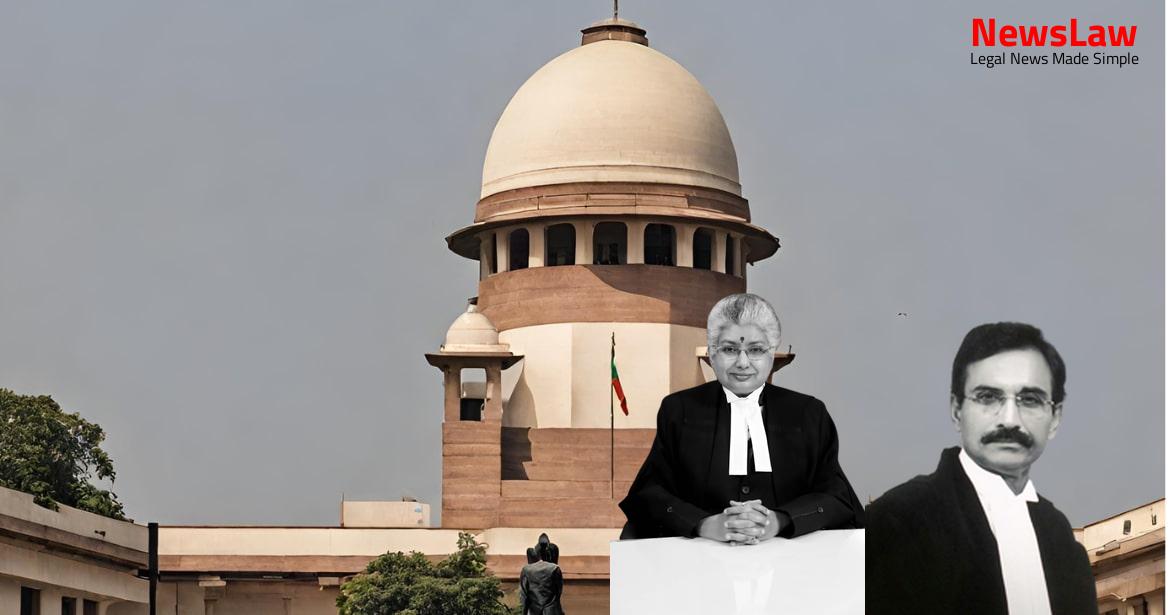Delve into the critical examination of insurance policy renewal and disclosure obligations in our recent legal case analysis. Discover how the court’s legal analysis sheds light on the duties and responsibilities of insurers in informing policyholders about changes in policy terms. Understanding the implications of the principle of utmost good faith and the duty to disclose material facts in insurance contracts can empower consumers to make informed decisions. Stay informed, stay protected!
Facts
- The appellants renewed their medical insurance policy annually by paying the premium.
- The insurer sent a reminder before the expiry date of the policy for renewal.
- The last renewal policy in question was for the period from 28.03.2008 to 27.03.2009.
- The appellants paid the premium by cheque issued on 26.03.2008 and received a receipt on 30.03.2008.
- The total coverage of the policy was ₹ 8,00,000, with ₹ 4,25,000 for the first appellant and ₹ 3,75,000 for the second appellant.
- The NCDRC upheld the insurer’s view that the renewal policy of 28.03.2008 was a fresh contract reflecting changes compared to the previous terms.
- The appellants filed a claim for ₹ 3,82,705.27 to the insurer, who paid a partial amount of ₹ 2,00,000.
- The appellants approached the District Consumer Forum seeking the balance amount of ₹ 2,07,705, costs, and interests on the compensation.
- The District Forum ruled in favor of the appellants, directing the insurer to pay the balance amount of ₹ 1,75,000 and awarded ₹ 5,000 as compensation.
- The second appellant underwent angioplasty in June 2008, between 09.06.2008 to 12.06.2008.
Also Read: Legal Analysis of Claim for Loss of Profit in Delayed Contract
Arguments
- Ms. Arundhati Katju, counsel for the appellants, argued that the State Forum and NCDRC erred in assuming the appellants were aware of the policy terms.
- The comparison between the previous and current policy showed a change in coverage limit, indicating deficient service by the insurer.
- The previous policy covered three individuals, while the current one covered only the appellants.
- Citing cases like Biman Krishna Bose v. United India Insurance Co. Ltd., it was emphasized that renewal implies existing terms binding the parties.
- The insurer issued a notice leading to policy renewal on 26.03.2008.
- The term ‘renewal’ does not hold special significance in this case as the policy in question is the first annual one for 2008-09.
- The premium paid for the policy for 2008-09 was 17,705/-, covering an overall limit of 8 lakhs.
- The policy for 2008-09 differed from the previous year due to a monetary limit on reimbursable expenditure by the insurer.
- At the time of renewal, there is no implied obligation on the insurer as each transaction signifies a fresh contract of insurance.
- The policy for 2008-09 is distinct from the preceding one, as evident from the higher coverage limit for two individuals compared to three in the earlier policy.
- The insurer cannot be blamed as there was no legal duty for them to inform the policyholder at the time of renewal about the new policy terms.
- The insurer acted according to IRDA’s directions and internal guidelines in setting the coverage limits.
- The responsibility to inquire about any changes in terms during renewal lies with the insured.
- The appellants did not challenge the dispatch of the policy after renewal.
- The insurer was not obligated to notify or intimate the appellants about potential changes in policy terms.
- The obligation to inform the insured about changes in policy terms is specified by IRDA in the Standardized General Terms and Clauses for Health Insurance Policy Contracts of 2020.
- The insurer’s compliance with IRDA’s directions regarding monetary caps was highlighted by the counsel.
Also Read: Public Declaration Requirement in Marriage under Hindu Marriage Act
Analysis
- The duty of insurers to inform policyholders about changes impacting their coverage is crucial
- Failure to inform policyholders about changes in the policy terms leads to deficiency of service
- The importance of prior intimation of change in terms in insurance contracts under the principle of uberrima fides
- Contracts of adhesion limit the consumer’s choice and leave little room for negotiation
- Disputes arise when unilateral changes are introduced without the knowledge of the policyholders
- The role of insurance agents and the obligations of insurers towards policyholders upon renewal of policies
- The obligation of insurers to provide information to policyholders for meaningful choice of products is emphasized
- The breach of obligation to inform policyholders about limitations in coverage results in deficiency of service
- The significance of public health in relation to insurance regulations and obligations of insurers
- The need for insurers to uphold good faith, fair practices, and transparency in insurance contracts
- Clause 1.2 of the policy for 2008-09 introduced restrictive conditions for claim admissibility.
- The policy specified different heads of expenses that would be covered, such as Room and Boarding Expenses, Nursing Expenses, Surgeon and Anaesthetist Fees, etc.
- Limits were set for specific illnesses like Cataract, Hernia, Hysterectomy, Angioplasty, and pre/post-hospitalization expenses.
- The previous policy had similar stipulations on limiting medical expenses under various heads.
- Both policies emphasized that the total claim amount should not exceed the Sum Insured per person mentioned in the schedule.
- Unilateral mistake about the terms of a contract does not automatically avoid the contract in India, unless it seriously undermines the entire agreement.
- The principle of uberrima fide (duty of utmost good faith) applies to both insured parties and insurers, requiring disclosure of all material facts.
- Good faith obligations prohibit hiding facts to deceive the other party into a bargain.
- Material facts in insurance contracts are those that influence insurer judgment in fixing premiums or accepting risks.
- Unfair terms in contracts, especially those removing free choice of consumers, may not be enforceable.
- Unfair trade practices and non-disclosure of material facts can render terms void or voidable in insurance contracts.
- For a contract to be void, mutual mistake of fact by both parties is required, unilateral mistake does not apply.
- Unfair terms in contracts can result from lopsided legal documents favored by one party over others.
- Non-disclosure of a tripartite agreement or ownership details may not necessarily render an insurance policy void or voidable.
- Before the completion of a contract, no material alterations can be made without mutual consent.
Also Read: OCI Cardholders’ Rights and Retroactive Notifications
Decision
- The renewal premium should not be accepted more than 90 days in advance of the due date.
- The appeal is allowed in this case.
- The respondent is ordered to bear additional costs amounting to 50,000/-.
Case Title: JACOB PUNNEN Vs. UNITED INDIA INSURANCE CO;LTD (2021 INSC 853)
Case Number: C.A. No.-006778-006778 / 2013



